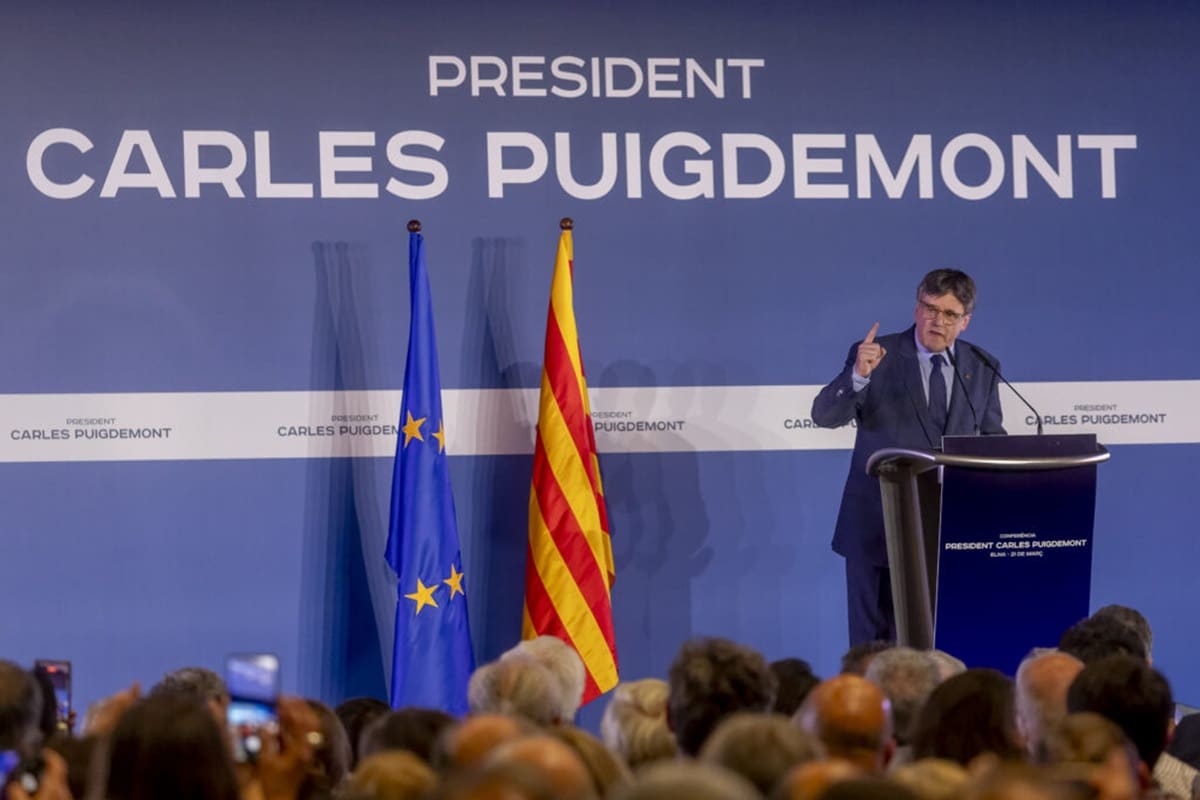From 1939 to 1978, Spain had a fascist dictatorship which was not defeated as in the case of Germany and Italy. The transition to democracy was not by conviction but because the world demanded it and it was very deficient. Since then, two major parties have alternated in power, PP from the right and PSOE from the center. The PP is the direct heir of fascism and the PSOE is also a heir, by the environmental osmosis of the same intolerant nationalism. Now, with an amnesty for Catalan pro-independence politicians and upcoming elections – could things be about to shift again? Possibly – as Puigdemont is standing in the elections.
Catalan independence
The ongoing independence attempt is the most powerful in history because now Spain cannot consider killing us in the institutional framework of the EU. In 2017 we held and won a self-determination referendum. The PP fought it using anti-democratic methods: judges, secret services, police; the the PSOE was doing the same: repression and denial of any option towards freedom for Catalonia.
In the recent electoral campaign, the PSOE ridiculed Catalan independence, assured that it would arrest and lock up in prison Carles Puigdemont (the president of Catalonia who carried out the referendum in 2017 and who is in exile in Belgium), and denied the possibility of an amnesty for pro-independence politicians or any referendum on self-determination for Catalonia.
The PSOE was showing off its chest by exhibiting the aggressive nationalism that is typical of the Spanish identity.
But the PP and the extreme right of VOX won the elections of July 23, 2023 without an absolute majority. Then the PSOE, seeing that it does not govern in any large region or city council, wanted to get the government of Spain so that its party has economic viability. And everything has changed. They no longer blaspheme the Catalan independentism, but they made a pact because they need their seven votes to govern.
An amnesty finally passed
On 7 March, the amnesty law that the PSOE said it would never approve was passed. And they have approved it with the Catalan pro-independence parties and other parties, in total eight parties (179 seats and 12.3 million votes).
It is a success for the Catalan independence movement because it has shown that they were falsely accused. Nobody would have been able to approve an amnesty that would pardon real terrorists. Spanish nationalism, in full fury, invented accusations against Catalan independence: rebellion, sedition, terrorism, treason, hate crimes, economic embezzlement.
But it is quite the opposite. The Catalan independence movement is exemplary in its democratic approach (it does not want to impose independence but has always wanted to hold a referendum of self-determination for the Catalan society to decide democratically) and it is not violent (it has made massive and peaceful mobilisations).
Aware that there had been “lawfare” (judicial dirty war), the PSOE has now accepted an amnesty.
Threats from the right
But the right and the extreme right do not want to accept it, because they see it as a defeat. They have always imposed themselves by force and now they do not want to accept the law passed by the Spanish parliament.
Judges threaten to sabotage the law and not to apply it. And the fact is that, there being no crimes, an amnesty law is needed because the judges accept the invented accusations and condemn the pro-independence supporters to destroy this political movement. With that motivation, the judges will look for subterfuges not to apply it and to continue condemning.
And all this is because now the PSOE needs the seven pro-independence votes. But what will it do when it does not need them? What will it do when the Catalan pro-independence movement, remade from this chapter of repression, mobilises again to free itself from Spain?
We know: both PP and PSOE will go back to repression. But for the moment, the independence movement has managed to demonstrate that it is not guilty of any crime and that it only wants freedom from a country that only increases the desire of the Catalans to free themselves from it.
Puigdemont returns?
A week ago, early Catalan elections were called for 12 May. Three or four pro-independence parties will run. However, on 21 March, in the town hall of Elna (in Northern Catalonia, now part of France), Puigdemont gave a conference in front of 1,400 people to make an announcement that will revolutionise Catalonia: Puigdemont is standing in the elections:

He will campaign online from Brussels because, if he were to set foot on Spanish soil, he would be arrested immediately. However, he has pledged that, if he wins and can be sworn in as president, he will return to Catalonia after seven years in exile:

He is expected to be covered by the amnesty law, although the Spanish courts will surely find a way to arrest him anyway and this will generate a head-on clash between the judiciary and the people of Catalonia:

The announcement has excited enthusiasm in Catalonia as, in the possibility of his victory, it is not only recognised as a very brave attitude on his part, but it would also be a restitution of the president illegally deposed in 2017 by the Spanish government, which would have a collective reparation effect for the Catalan society that is fed up with Spanish repression and authoritarianism.
Accept the result and move on
This foreseeable conflict has set off all the alarm bells in Spain, which is in a state of shock and the Madrid press is talking about nothing else. They are afraid that Catalonia’s desire to decide its political future will return to the forefront of the news and that they will end up having to accept their right to exercise self-determination.
The EU cannot continue tolerating these abuses and will have to intervene sooner or later, because the European Justice is about to issue judgments against Spain (this imminence has also motivated the PSOE to approve the amnesty).
In order not to waste time, or energy, or increase the Spanish institutional crisis, it would be better for the EU to force Spain to accept the result of the 2017 referendum or hold a new one in which the Catalans can decide their future free of impositions and authoritarianism.
Featured image via Albert Salamé, www.vilaweb




